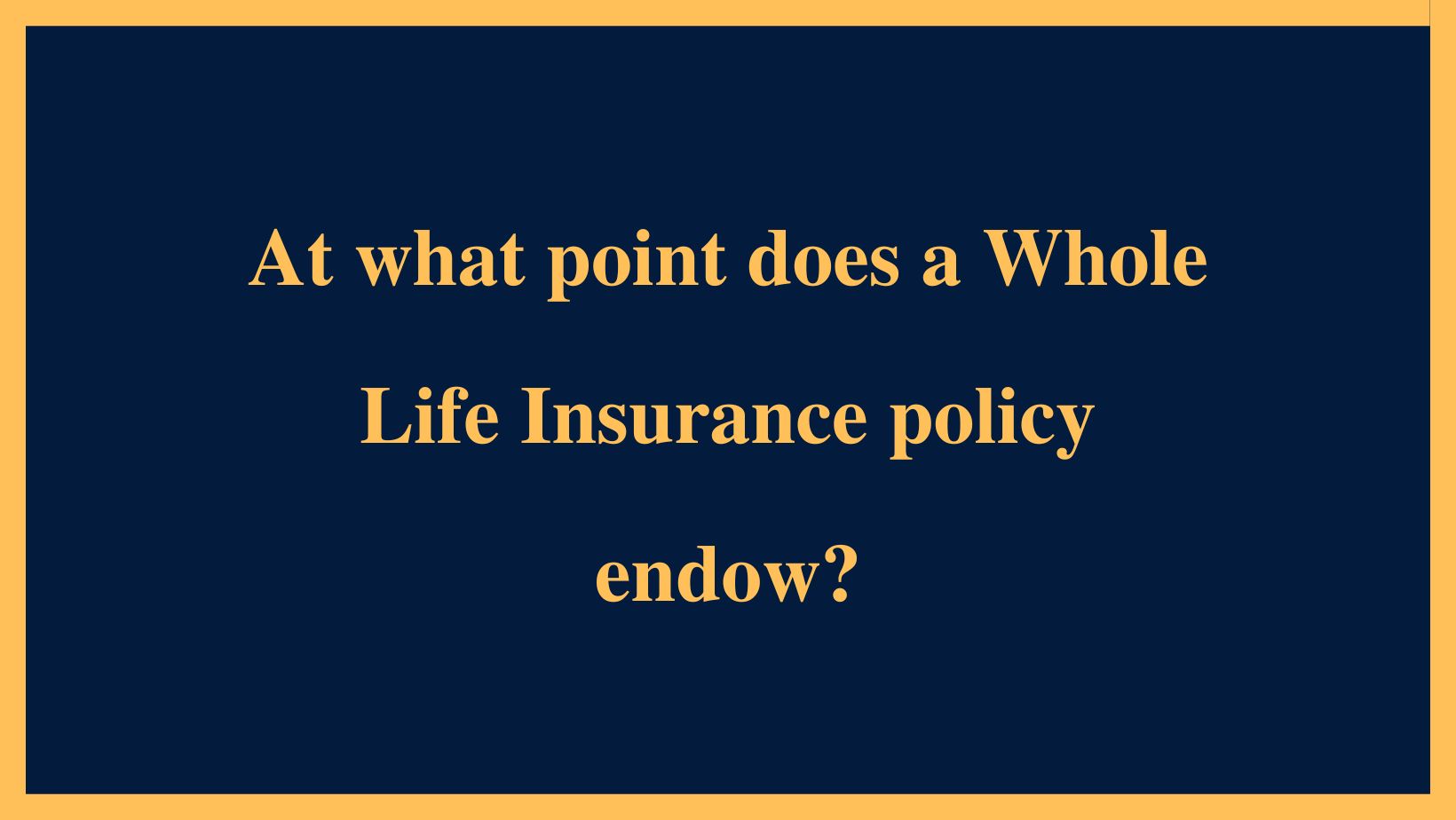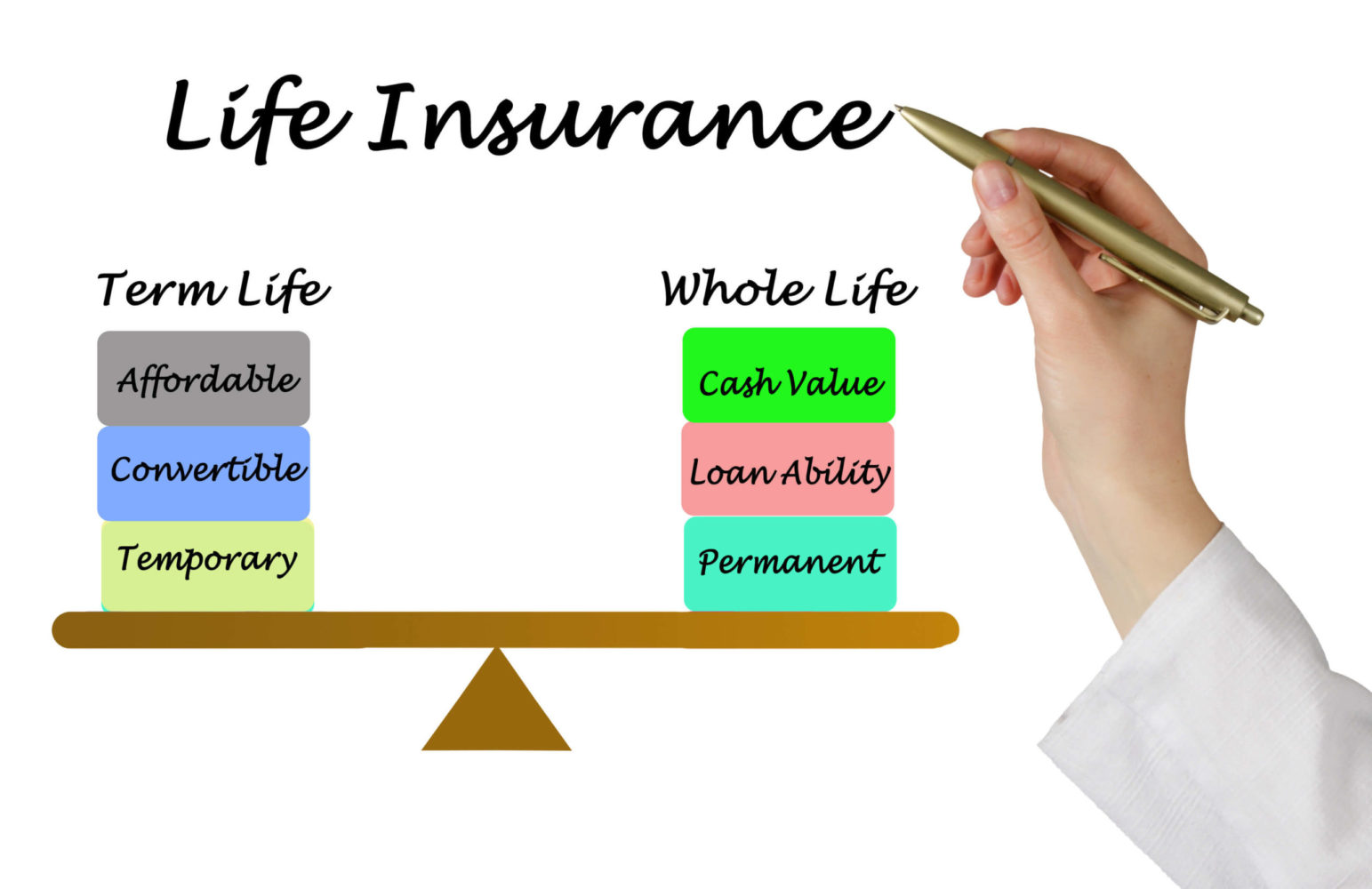

Finance
What Is A Graded Whole Life Insurance Policy?
Modified: February 21, 2024
Learn about graded whole life insurance policies, a type of insurance option that provides coverage for individuals with pre-existing health conditions. Discover how it can benefit your personal finance goals.
(Many of the links in this article redirect to a specific reviewed product. Your purchase of these products through affiliate links helps to generate commission for LiveWell, at no extra cost. Learn more)
Table of Contents
- Introduction
- Definition of a Graded Whole Life Insurance Policy
- How Does a Graded Whole Life Insurance Policy Work?
- Pros and Cons of a Graded Whole Life Insurance Policy
- Factors to Consider Before Choosing a Graded Whole Life Insurance Policy
- Common Misconceptions About Graded Whole Life Insurance Policies
- Alternatives to Graded Whole Life Insurance Policies
- Conclusion
Introduction
When it comes to financial planning, one aspect that often gets overlooked is life insurance. Life insurance provides protection to your loved ones in the event of your passing, ensuring they are financially secure even without your income. While there are various types of life insurance policies available, one option that offers unique benefits is a graded whole life insurance policy.
A graded whole life insurance policy is a type of permanent life insurance that is designed to provide coverage for the entirety of your life. What sets it apart from other types of life insurance policies is its accessibility, particularly for individuals who may have difficulty obtaining traditional life insurance coverage due to health issues or other factors.
This article will delve into the details of graded whole life insurance policies, explaining how they work, their pros and cons, and factors to consider before choosing this type of policy. Additionally, we will address common misconceptions and provide alternatives to graded whole life insurance policies, giving you a comprehensive understanding to make an informed decision about your life insurance needs.
Definition of a Graded Whole Life Insurance Policy
A graded whole life insurance policy is a type of permanent life insurance that provides coverage for the entirety of your life. Unlike term life insurance, which provides coverage for a specific period of time, graded whole life insurance remains in effect as long as the premiums are paid.
What makes graded whole life insurance unique is how it takes into account the potential health risks of the policyholder. It is commonly offered to individuals who may face difficulty obtaining traditional life insurance coverage due to pre-existing health conditions, a history of smoking, or other lifestyle factors that increase their risk profile.
With a graded whole life insurance policy, the premiums are typically higher compared to traditional policies due to the higher risk associated with the insured individual. However, the policyholder is guaranteed coverage regardless of their health condition, as long as they continue to pay the premiums.
One important feature of a graded whole life insurance policy is the graded benefit period. During this period, which usually lasts two to three years, the policyholder’s beneficiaries will receive a modified death benefit if the insured individual passes away. The modified benefit is typically a percentage of the policy’s face value, which is predetermined by the insurance company at the time of policy issuance.
It’s important to note that the specific terms and conditions of a graded whole life insurance policy can vary between insurance providers. It’s crucial to carefully review the policy documents and understand the details before making a decision.
How Does a Graded Whole Life Insurance Policy Work?
A graded whole life insurance policy works by providing coverage for the duration of your life, as long as the premiums are paid. Here’s a step-by-step breakdown of how it works:
- Premium Payments: As with any insurance policy, you will be required to make regular premium payments to keep the policy in force. The premium amount is determined based on various factors, including your age, health condition, and the coverage amount you choose.
- Graded Benefit Period: In a graded whole life insurance policy, there is typically a graded benefit period. This period usually lasts two to three years, during which the policyholder’s beneficiaries will receive a modified death benefit if the insured individual passes away. The modified death benefit is usually a percentage of the policy’s face value, as determined by the insurance company.
- Waiting Period: During the graded benefit period, there is often a waiting period before the policy provides full death benefit coverage. This waiting period is designed to mitigate the higher risk associated with the insured individual’s health condition. It allows the insurance company to assess the risk and adjust the death benefit accordingly.
- Full Death Benefit: After the waiting period has elapsed, the policy typically provides the full death benefit coverage. This means that if the insured individual passes away, the beneficiaries will receive the entire face value of the policy as a death benefit. This can provide financial security and support to your loved ones in the event of your untimely passing.
- Cash Value Accumulation: Like other types of whole life insurance policies, graded whole life insurance policies often have a cash value component. Over time, a portion of your premium payments will accumulate as cash value within the policy. This cash value can be accessed through policy loans or withdrawals, providing a potential source of funds in the future.
It’s important to review the specific terms and conditions of the graded whole life insurance policy you are considering, as the details can vary between insurance providers. Understanding how the policy works and its features will help you make an informed decision based on your individual circumstances and financial goals.
Pros and Cons of a Graded Whole Life Insurance Policy
Like any financial product, a graded whole life insurance policy has its advantages and disadvantages. Understanding these pros and cons can help you determine if this type of policy aligns with your financial goals and insurance needs. Let’s explore both sides:
Pros:
- Accessibility: One of the major advantages of a graded whole life insurance policy is its accessibility. Individuals with pre-existing health conditions or other risk factors that make it difficult to obtain traditional life insurance coverage may still qualify for a graded policy. This allows them to secure life insurance protection and provide financial security for their loved ones.
- Guaranteed Coverage: With a graded whole life insurance policy, as long as you continue to pay the premiums, you are guaranteed coverage for your entire life. This means that your beneficiaries will receive a death benefit when you pass away, providing them with financial support in a difficult time.
- Cash Value Accumulation: Graded whole life insurance policies often have a cash value component, which accumulates over time. This cash value can be accessed through policy loans or withdrawals, providing you with a potential source of funds in the future for various purposes, such as emergencies or retirement.
- Stable Premiums: Unlike term life insurance policies, graded whole life insurance policies typically have fixed premiums that do not increase over time. This offers stability and allows you to budget for the premiums throughout your life.
Cons:
- Higher Premiums: One of the main drawbacks of a graded whole life insurance policy is the higher premiums compared to traditional policies. This is due to the increased risk associated with the insured individual’s health condition. It’s important to consider whether the higher premiums fit within your budget and if the benefits outweigh the costs.
- Graded Benefit Period: A graded whole life insurance policy often includes a graded benefit period during which the death benefit is modified. This means that if you pass away during this period, your beneficiaries will not receive the full face value of the policy. It’s essential to understand the specific terms and conditions regarding the graded benefit period before purchasing the policy.
- Limited Coverage Options: Graded whole life insurance policies may have limitations in terms of coverage options and face values compared to other types of life insurance. It’s crucial to assess whether the coverage provided by a graded policy meets your specific needs and aligns with your long-term financial goals.
Consider these pros and cons when evaluating a graded whole life insurance policy. It’s important to carefully review the policy details and consult with a financial advisor to ensure it aligns with your unique circumstances and objectives.
Factors to Consider Before Choosing a Graded Whole Life Insurance Policy
Before deciding to purchase a graded whole life insurance policy, it’s important to carefully evaluate various factors to determine if it is the right choice for you. Here are key considerations to keep in mind:
Health Condition:
Since graded whole life insurance policies are designed for individuals with pre-existing health conditions or higher risk profiles, it’s crucial to assess your health condition. Determine if you qualify for traditional life insurance coverage or if a graded policy is the more suitable option. Be prepared to provide medical records or undergo a medical examination as part of the application process.
Financial Situation:
Consider your current financial situation, including your income, expenses, and budget. Graded whole life insurance policies tend to have higher premiums compared to traditional policies. Assess whether the premium payments fit within your budget without causing financial strain. It’s important to strike a balance between the coverage provided and the affordability of the premiums.
Coverage Needs:
Evaluate your coverage needs and determine if the face value offered by a graded whole life insurance policy aligns with those needs. Consider factors such as outstanding debts, mortgage payments, educational expenses, and any financial obligations you want to cover with the policy. Ensure that the coverage amount is sufficient to provide financial security for your loved ones in the event of your passing.
Policy Features:
Review the specific features and terms of the graded whole life insurance policy you are considering. Pay attention to details such as the graded benefit period, waiting period, and any limitations or restrictions. Understand the implications of these features on the death benefit, premium payments, and overall policy performance.
Alternative Options:
Explore alternative life insurance options available to you. Consider term life insurance, which offers coverage for a specific period of time and may be more affordable for individuals without significant health concerns. Compare the benefits and drawbacks of different types of life insurance policies to ensure you are making an informed decision.
By carefully considering these factors, you can make an informed decision about whether a graded whole life insurance policy is the right choice for your financial situation and insurance needs. It’s advisable to consult with a financial advisor who specializes in insurance to guide you in the decision-making process.
Common Misconceptions About Graded Whole Life Insurance Policies
When it comes to graded whole life insurance policies, there are several misconceptions that can lead to misunderstandings about how these policies work and their benefits. Let’s address some of the most common misconceptions:
Misconception 1: Graded Policies Are Only for People with Serious Health Conditions
While it is true that graded whole life insurance policies are often marketed to individuals with pre-existing health conditions, they are not exclusively for those with serious health issues. Graded policies are also suitable for individuals who may have moderate health conditions or a history of certain lifestyle factors that increase their risk profile, such as smoking. These policies provide an opportunity for individuals who may be denied coverage for traditional life insurance to still obtain life insurance protection.
Misconception 2: The Death Benefit Is Always Reduced During the Graded Benefit Period
During the graded benefit period, the death benefit may be modified, but it is not always reduced. The specific details of the graded benefit period can vary between insurance providers and policies. In some cases, the death benefit may remain the same during the waiting period, while in others, it may be a percentage of the policy’s face value. It’s essential to review the terms and conditions of the policy to understand how the death benefit is affected during this period.
Misconception 3: Graded Policies Are Only for Older Individuals
While graded whole life insurance policies can be suitable for older individuals, they are not exclusive to this age group. These policies can be beneficial for individuals of various age groups who may have health conditions or other factors that classify them as higher risk. Graded policies can offer coverage for younger individuals as well, providing them with long-term protection and financial stability for their loved ones.
Misconception 4: Graded Policies Are Expensive and Not Worth It
While it is true that graded whole life insurance policies generally have higher premiums compared to traditional policies, they are designed to provide coverage to individuals who may not have other options due to health conditions or risk factors. The value of a graded policy lies in the accessibility and guarantee of coverage, regardless of health condition. For the right individuals, the peace of mind and financial security provided by a graded policy can outweigh the higher premium costs.
Misconception 5: Graded Policies Are the Only Option for High-Risk Individuals
Graded whole life insurance policies are not the only option for individuals classified as high-risk. It’s important to explore alternative insurance options and consult with insurance professionals who can assess your unique circumstances. Depending on the severity of your health condition or risk factors, there may be other life insurance policies available that offer better coverage or more favorable terms.
By dispelling these misconceptions, you can have a clearer understanding of what a graded whole life insurance policy entails and how it can benefit individuals with specific insurance needs. It’s crucial to conduct thorough research, consult with experts, and carefully evaluate your options before making a decision.
Alternatives to Graded Whole Life Insurance Policies
While graded whole life insurance policies can be beneficial for individuals with pre-existing health conditions or higher risk profiles, they may not be the right fit for everyone. Fortunately, there are alternative options to consider when seeking life insurance coverage. Here are a few alternatives to graded whole life insurance policies:
Term Life Insurance:
Term life insurance is a popular alternative to graded whole life insurance. With term life insurance, you purchase coverage for a specific period, typically ranging from 10 to 30 years. This type of policy offers a high death benefit for a lower premium compared to permanent life insurance. Term life insurance may be a suitable choice if you are looking for coverage for a specific timeframe, such as to protect your loved ones during your working years or to cover outstanding debts or mortgage payments.
Guaranteed Issue Whole Life Insurance:
Similar to graded whole life insurance, guaranteed issue whole life insurance is designed for individuals who may have difficulty obtaining traditional life insurance coverage. These policies typically do not require a medical exam or health questionnaire, making them accessible to those with health conditions. While the premiums for guaranteed issue whole life insurance are generally higher, it provides coverage for the insured individual’s lifetime and offers a guaranteed death benefit.
Accidental Death Insurance:
If your primary concern is protecting your loved ones in the event of an accidental death, you may consider accidental death insurance. This type of policy pays a death benefit if the insured individual dies as a result of an accident. Keep in mind that accidental death insurance does not provide coverage for death due to illness or natural causes.
Modified Whole Life Insurance:
Modified whole life insurance policies are similar to graded whole life insurance policies in that they provide coverage for individuals with health conditions or higher risk profiles. These policies typically have a modified benefit period during which the death benefit is reduced. However, after the waiting period, the policy provides the full death benefit. Modified whole life insurance may be a suitable option if you have moderate health conditions but still want the long-term coverage and cash accumulation features of a whole life policy.
It’s crucial to carefully evaluate your insurance needs, financial situation, and health condition before selecting an alternative to a graded whole life insurance policy. Consulting with a financial advisor or an insurance professional can help you navigate the options and determine the best type of policy that aligns with your specific circumstances and goals.
Conclusion
Graded whole life insurance policies offer a unique solution for individuals with pre-existing health conditions or higher risk profiles who may have difficulty obtaining traditional life insurance coverage. These policies provide guaranteed coverage for the entirety of your life, ensuring that your loved ones are financially protected in the event of your passing. With a graded policy, you have the opportunity to secure life insurance protection and provide peace of mind to yourself and your family.
While there are some considerations to keep in mind, such as the higher premiums and the graded benefit period, graded whole life insurance policies provide accessibility and a guaranteed death benefit compared to other types of policies. Additionally, the cash value accumulation feature can serve as a potential source of funds in the future.
It’s essential to carefully assess your individual circumstances, including your health condition, financial situation, and coverage needs, before choosing a graded whole life insurance policy. Consider alternative options like term life insurance, guaranteed issue whole life insurance, accidental death insurance, or modified whole life insurance to determine the best fit for your needs. Consulting with a financial advisor or an insurance professional can provide valuable guidance in making the right decision.
Remember, life insurance is an important part of any comprehensive financial plan. It helps protect the financial well-being of your loved ones and provides peace of mind knowing that they will be taken care of in the event of your passing. By understanding graded whole life insurance policies and exploring alternative options, you can make an informed decision that aligns with your individual circumstances and provides the coverage you need.














